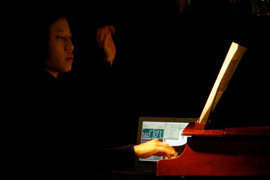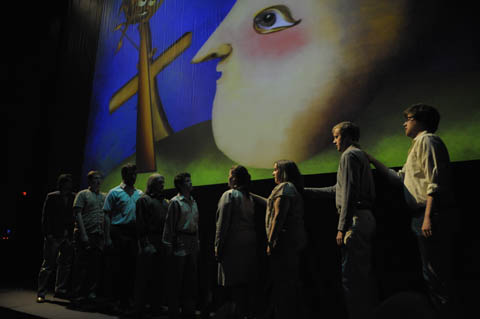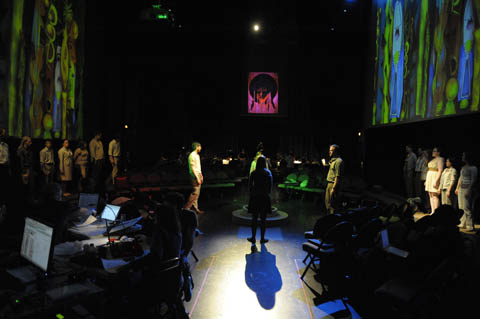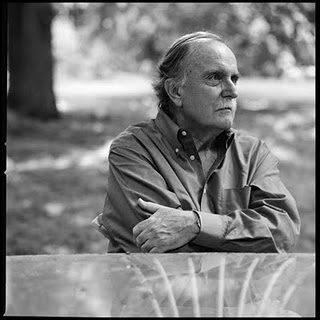
This Spring, Baltimore-based composer David Smooke composed Criminal Element, a “nonopera” in a fabricated language, for Rhymes with Opera, a company devoted to presenting opera in nontraditional spaces. Alongside works by Martin Zimmerman, Ryan Jesperson, and George Lam, it premieres Friday, June 17th in Brooklyn at Cafe Orwell. The program, titled Criminal Intent (hopefully Dick Wolf won’t sue), will be repeated in Baltimore, Hartford, and Boston.
As if it weren’t hard enough to compose an opera, non or otherwise, in the midst of a busy semester teaching at the Peabody Institute, where Smooke is a faculty member, the composer decided to create his own libretto, in a made-up language built out of IPA no less! To help us translate this phonetic construction and its backstory, I asked for some further information about the piece, which he shares below.
Smooke says, “In this nonopera, I consider the fraud—the unveiling of which helped spark the recession of 2008—perpetrated by Jérôme Kerviel, the rogue trader from France’s Société Générale who appeared to me to function as the archetypical white-collar criminal. Like his British counterpart Nicholas Leeson, who brought down the venerable Barings Bank in the 1990s, Kerviel was an interloper in the European banking society. These men were among the first working-class hires within traditionally upper-class departments and both appear to have perpetrated their crimes as part of their vain attempts to please their superiors through outworking and outsmarting their colleagues. Here, scenes of trading—number arias—recur throughout, with each growing progressively more tense. Life beyond the office is represented by a lullaby sung by paternal and maternal figures (Kerviel’s parents were a blacksmith and hairdresser in Pont-l’Abbé, Brittany), and by snippets of city life that include an invitation from friends to join their revelry. Although this piece creates theatrical scenes with some referential elements, it is a meditation on class differences and on the germinating factors in exorbitant criminal events, and is not intended to portray the life of any specific individual.”
“There is no text; the action is conveyed through an invented language notated in the International Phonetic Alphabet. The action therefore remains relatively ambiguous and non-specific. I ask the singers and the string quartet to explore many unusual performance techniques, which force them to stretch beyond their normal comfort zones.”

CRIMINAL INTENT
Featuring the West End String Quartet
Orphée Redux and Someone Anyone directed by Elspeth Davis
Friday, June 17 at 7pm | Café Orwell
247 Varet St, Brooklyn, NY 11206
Saturday, June 18 at 6pm | Windup Space
12 W North Ave, Baltimore, MD 21201
*A party for Friends of RWO after the show!*
Friday, June 24 at 7:30pm | Real Art Ways
56 Arbor St, Hartford, CT 06106
Saturday, June 25 at 2pm | Yes!Oui!Si! Space
19 Vancouver St, Boston, MA 02115
- RYAN JESPERSON Orphée Redux
- MARTIN ZIMMERMAN and GEORGE LAM Someone Anyone
- DAVID SMOOKE Criminal Element (2011, premiere, commissioned by RWO)
Sponsorship, in part, by: topsweepscoinscasino.com




















